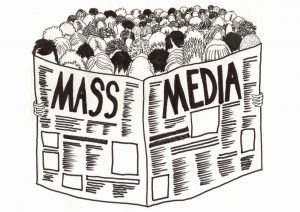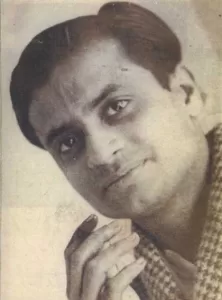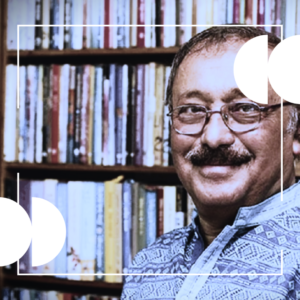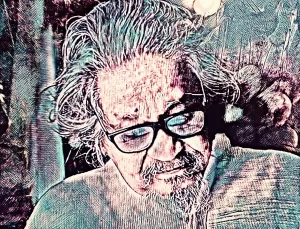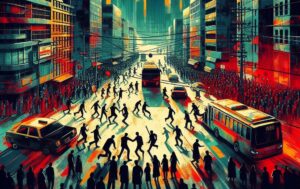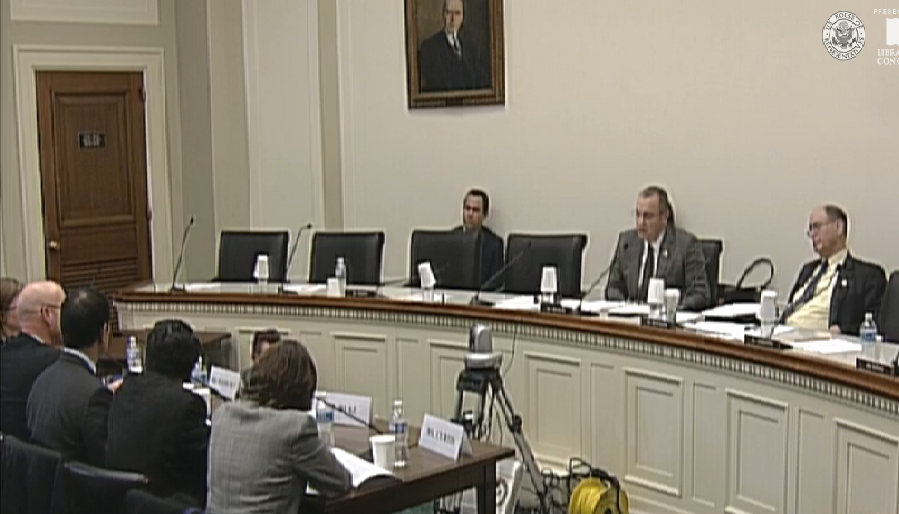
BANGLADESH’S FRACTURE: POLITICAL AND RELIGIOUS EXTREMISM
Testimony before the Subcommittee on Asia and the Pacific Committee on Foreign Affairs
United States House of Representatives
April 30, 2015
Ali Riaz
Professor and Chair
Department of Politics and Government
Illinois State University
Normal, IL
Chairman Salmon and Members of the Committee, thank you for the invitation to discuss the political situation in Bangladesh.
In the past year and a half Bangladeshi politics has experienced a tumultuous and puzzling period. The period is marked by two episodes of heightened violence (late 2013, early 2015), a flawed national election (2014), unremitting heavy handed actions by the government (2013-15), and highly rigged city corporations elections (28 April 2015) – all of which raise serious concerns regarding the future trajectory of the country’s politics, particularly the prospects for democracy. Although 2014 was a year of relative peace, the uncertainty that has gripped the nation since 2011 hasn’t disappeared. It is the absence of trust among major political parties, lack of a consensus on the modus operandi of holding an inclusive national election, and the dearth of institutions to protect the fundamental rights of the citizens, including exercising the right to vote freely, that together undergirds this uncertainty.
Against this background the fundamental questions are: whether the nation will continue to tread the path of ‘living dangerously’?; What’s to be done?; What are the future trajectories?; and What, if any, role can the international community play? Answers to these questions necessitate reviewing the major events of the past year and a half and identifying the current state of affairs of Bangladeshi politics.
Violence, a Flawed Election and a Year of Relative ‘Calm’
Prior to the elections in early 2014, the country was wracked by violence for months. The opposition parties, particularly the Bangladesh Nationalist Party (BNP)-led alliance, demanded the restoration of the caretaker government proviso in the constitution to oversee the election. Prime Minister Sheikh Hasina and the ruling AL rejected this as unconstitutional, pointing out that elections in other parliamentary systems normally go forward without recourse to interim caretaker arrangements. The ruling party insisted that holding the election was imperative for constitutional continuity. The BNP took to the streets; general strikes and blockades ensued while the government responded with force, arrested the BNP leaders, and put Khaleda Zia under virtual house arrest. Several spates of violence throughout the year cost at least 500 lives, according to Human Rights groups. The UN-mediated negotiation between two parties failed. Immediately before the election the PM promised that negotiations will resume after the election for an early election of the next parliament if the BNP end the violence agitations and sever its alliance with the Islamist party Bangladesh Jamaat-i-Islami (BJI), which played an active role against the war of independence in 1971 and some of leaders of the party were being tried for war crimes.
The election, held on 5 January 2014, delivered a landslide victory to the incumbent alliance as only 12 of 40 registered parties participated. Some of these parties represented only a handful of candidates. The Jatiya Party (JP) led by former dictator H M Ershad was coerced into participating. More than half of the members of parliament— 153 out of 300—were the only candidates for their seats, practically disenfranchising more than 50 percent of the voters. The overall voter turnout was at an historic low. However, the BNP failed to mount a popular mobilization against the government in the days leading up to the vote and stop the election from being held. This is due to its lack of organizational capacity, and its alliance (perhaps reliance on), the BJI. With the inclusion of the JP in the new cabinet, which was also officially designated the ‘opposition party’, the parliament has turned into a de facto one-party institution with no institutional checks.
Soon after the election, the BNP called off its agitation programs. Subsequently, Khaleda Zia insisted that the BNP’s alliance with the BJI is tactical, instead of ideological. The PM and the ruling party reneged on their promise to hold negotiations for a new election and declared their intention to serve a full term until 2019. Elections to the Upa Zilla (Sub-District) Councils, the second lowest tier of elected local administration, were held in February through May. Although these elections are officially held on a ‘non-partisan’ basis, contestants typically represent various political parties. Elections to 457 councils were held in five phases between February and May 2014. The first two phases were held fairly without any large-scale interference of the ruling party activists and the Election Commission demonstrated significant neutrality. The opposition supported candidates for the council Chairmen were elected in large numbers (out of 212 seats 93 went to the BNP, 78 to the AL, and 21 to the BJI supported candidates). But intimidation of opposition candidates, vote rigging, capture of polling centers by ruling party activists’ marred the subsequent phases and the EC turned a blind eye to these irregularities resulting in the victory of the AL candidates in large numbers ( out of 245 seats, 145 went to the AL, 65 to the BNP, and 15 to the BJI). The result demonstrated that the EC has failed overall to maintain its neutrality.
Throughout 2014 the country enjoyed relative peace and stability while the opposition leaders faced persecution. Cases against opposition leaders, at times frivolous, were filed. Cases against BNP leader Khaleda Zia were revived and/or proceedings started.
The Return of the Violence
The situation took a turn for the worse in early 2015, when the Bangladesh Nationalist Party (BNP) called for demonstrations to mark the anniversary of the controversial election and press for the demand to hold elections under a neutral government. The BNP-led alliance was denied the opportunity to hold a public rally and the BNP leader Khaleda Zia was confined at the party office, the BNP launched general strikes and imposed a countrywide blockade which unleashed violence. Numerous incidents of throwing homemade petrol bombs and burning public transport, especially public buses with passengers inside, took place. The government blamed the BNP for orchestrating these incidents while the BNP alleged that they were carried out by the ruling party activists to defame the opposition movement. Although arrests of some ruling party activists with homemade bombs similar to the ones used in the arson attacks gave some credence to the BNP’s allegation, there was very little doubt that most attacks were made by BNP supporters and activists of the Bangladesh Jamaat-i-Islami (BJI). In the initial days of the movement the regime and the ruling party showed nervousness. But the abject failure of the BNP to show any public mobilization (such as rallies, public demonstrations) gradually weakened its claim to enjoy public support. Their tactics, if not the demand, lost appeal. The conspicuous absence of the BNP leaders in the political scene raised skepticism about the goal while Khaleda Zia and her confidants continued to claim success. Over time, the party seemed to lose grip of the movement and it appeared to be a series of sporadic violent activities. The popular perception that the actions were conducted under the instructions of Tarek Rahman, son of Khaleda Zia with a checkered past who is in self-imposed exile in London, didn’t help the party either.
Law enforcing agencies were given a free hand in dealing with opposition activists. Overall, 138 people died in the violence that gripped the country for 91 days. Of these 74 died in incidents of bomb attacks or burning vehicles, 10 died in clashes with either law enforcement agencies (such as the police, the Rapid Action Battalion, and the Bangladesh Border Guards) or between supporters of the government and the opposition. At least 37 people were killed in ‘crossfire’/ ‘encounters’ – official descriptions used to justify extrajudicial killings by the law enforcement agencies.
The government’s decision to resort to harsh tactics, including arresting opposition leaders and the deaths of activists at the hands of law enforcement forces, exacerbated the situation. According to human rights groups at least 15,000 people, mostly opposition activists, were arrested and many of them have been detained without any charges. Deaths from political violence, clashes between the members of the law enforcing agencies and opposition activists, and extra-judicial killings perpetrated by the law enforcing agencies continue to mount. Repeated calls from the international community and members of the civil society within Bangladesh for a dialogue to address the political impasse have been rejected by the ruling party. The opposition also declined to scale down its agitation.
By the time the three month long agitation and violence came to an end, the country had already suffered heavy losses – in terms of the economy $2.2 Billion, almost 1 percent of its GDP growth; public examinations for students had to be postponed several times and educational institutions lost school days creating disarray in the academic calendar.
Worrying Trends
In the past three years, a number of disturbing trends have emerged which threaten the personal safety and security of citizens and reflect the sorry state of the Human Rights situation in the country. Two deserve special attention: extrajudicial killings and enforced disappearances.
According to Human Rights Group Ain O Salish Kendra (ASK), extrajudicial killings by various law enforcing agencies have become commonplace since 2004, the year the elite Rapid Action Battalion (RAB) was founded. Over time a pattern has emerged that shows that the RAB has targeted political activists. In 2009, the number of people killed stood at 229. In 2010, 133 people were killed either in crossfire or while in custody. In 2012 the number declined to 91 but rose to 208 in 2013. In 2014, despite the absence of any anti-government movement, at least 154 people were killed, 54 of them died while in police custody. The group further reports that in the first three months of 2015, law enforcement agencies have killed 64 people in separate incidents of ‘crossfire’. Despite well documented incidents, the government continued to deny the extrajudicial killings. It is also worth noting that during the episodes of violence in 2013 and 2015, the government had deployed the Border Guard Bangladesh (BGB), and created joint forces comprising various law enforcement agencies to address political unrest and violence; often members of these forces used such heavy-handedness that many believe their actions can be considered unlawful. Importantly, in early 2015 as the opposition launched its blockade program and violence engulfed the country, comments of ruling party leaders including the Prime Minister had given an impression that their actions were preemptively indemnified. The Attorney General, on 3 February 2015, said the officers should instantly retaliate by shooting at those who throw bombs at transport convoys (http://newagebd.net/92335/ag-urges-law-enforcers-to-shoot-at-arsonists/#sthash.i4bZ5MjG.4wNv7MlX.dpbs). High ranking officials of law enforcement agencies made highly provocative comments. Deputy Inspector General (DIG) of the Dhaka Range police, on 7 February, referring to suspected arsonists said, “Not only shall you fire at them but their family members too should be annihilated. I give you this order and the liability is mine” (http://www.observerbd.com/2015/02/08/71390.php). On 4 February the Deputy Inspector General (DIG) of the Chittagong range police said the force has “the capability to avenge one killing with two” (http://www.observerbd.com/2015/02/04/70614.php). It is worth recalling that of the 64 people named in the extra judicial killings in the first three months of 2015, 24 of them died at the hands of the members of the police force.
The second phenomenon is abduction or enforced disappearance. It has increased dramatically since 2010. Reports by relatives and friends of individuals abducted by plain-clothed members of law enforcing agencies, including the elite force named Rapid Action Battalion (RAB) and/or supporters of the regime demonstrate the extent of the practice. The Government denies any involvement either on the part of the police or the RAB. According to Odhikar, there were three incidents of enforced disappearances in 2009, 18 in 2010, 30 in 2011, and 24 in 2012. According to ASK, 53 disappeared in 2013. It documented 229 enforced disappearances between 2010 and 2013. The number increased dramatically after the controversial election in 2014. In the first four months of 2014, at least 53 people disappeared; the number increased to 88 by the end of the year. Dead bodies of a number of people have been discovered after a long period. These dead bodies bore marks of torture and execution. According to the ASK, between January and March 2015,family members and relatives of the victims informed them that 25 people were picked up by the members of law enforcement agencies either in plainclothes or claiming to be members of a law enforcement agency.
Two recent incidents illustrate the nature of these abductions. Joint Secretary General of the BNP and former Deputy Minister Salah Uddin Ahmed was allegedly picked up by members of the law enforcement agency on 10 March 2015 from a house where he had been in hiding since the BNP-led agitation began in January 2015. He was acting as the BNP spokesperson as most of the senior leaders were incarcerated and were operating clandestinely after the party central office was locked up by the police. Eyewitness accounts including of the security guard gathered by Human Rights groups and media revealed that men in plain clothes claiming to be members of law enforcement agencies had picked him up at night, His chauffeur and personal staff were arrested days before. The police didn’t want to register his wife’s case as Salah Uddin is a missing person. Despite the High Court issuing a ruling to the government to produce him at court, the government hasn’t complied.
On February 23, 2015 at around 3:30 am, Mahmudur Rahman Manna, the Convener of Nagorik Oikya, a small political party but vocal critic of the government, was picked up by a group of men who said they were members of the DB police, from a residence in Dhaka. Police denied that he had been arrested, but his family filed a case. Almost 21 hours later, he was handed over to police by the RAB who claimed to have arrested him at around 11:00 pm on February 23, from a street in Dhaka. He was then charged with allegedly instigating the Army to mutiny. These recent incidents like others before them show that the regime loyalists (and law enforcement agencies) enjoy impunity which contributes to the increasing number of such incidents. Concurrent to these is the significant increase in vendetta and vigilante justice. Often they are committed by hired guns. This has contributed to the growing incidence of gruesome murders.
Some events have already laid bare the connections between abductions, extrajudicial killings and law enforcement agencies. A glaring example is the abduction and murders of seven people in Narayanganj, a city located southeast of capital. On 27 April 2014, seven people, including a ward commissioner of the city corporation, Nazrul Islam, and his lawyer, Chandan Sarkar, were abducted while they were returning home after a court appearance. Their mutilated dead bodies were found in a nearby river a few days later. It was alleged that the local RAB commander, a relative of an influential cabinet member, had taken bribes from the rival AL leader for the abduction and killing. Popular outrage and press reports led to the retirement of three RAB officials, including the commander of the unit, Lt-Col Sayeed Tareq. Other allegations against him also surfaced. The High Court, in response to a writ petition filed by Kamal Hossain (an eminent lawyer and opposition leader) ordered the Government to take them into custody. The Prime Minister expressed annoyance with the writ and after several days the RAB officers were arrested. As of early April 2015 police have pressed charges against 35 individuals including 19 RAB or former RAB officials.
Violence has been a part of Bangladeshi politics for long. But the nature and scope of political violence has changed for the worse in the past year and a half. We have witnessed that common citizens, with no political affiliations, have become targets of attacks. Incidents of arson and throwing homemade petrol bombs at public transports during the period between January and April in 2015 were rampant and not only cost 74 lives but also maimed hundreds. Public outcry against these attacks notwithstanding, there have been tendencies to justify them on the one hand while taking political advantage of these crimes, on the other. There have been no public inquiries to find the perpetrators and bring them to justice. These failures will only encourage recurrence in future. It is also worth noting with great concern that in each episode of violence the minority communities, especially the members of the Hindu communities, have become victims and the state has miserably failed to protect them.
It is a public knowledge in Bangladesh that the government has increased surveillance over private citizens and political leaders. The legality of the measures employed is unclear. Press reports have shown that although surveillance equipment was procured by the intelligence agencies to enhance their capability to monitor and fight militant groups, they are now allegedly being used against political opponents and critics of the government. According to media reports, Swiss authorities recently seized a consignment of surveillance equipment purchased by the Rapid Action Battalion (RAB) in response to the reports of human rights violations. On several occasions telephone and Viber communications between political leaders have been made public and broadcast by pro-government media. The first major incident was the broadcast of the telephone conversation between the Prime Minister Hasina and BNP leader Khaleda Zia in November 2013. Since then there have been several other instances. Interestingly, the government has shown no interest in exploring how the media acquired the recordings.
Additionally, the newly enacted National Broadcasting Policy (2014) has imposed several restrictions on the content of reporting and advertisement on 46 government approved media channels. The infamous proviso of the Information and Communication Act (Article 57) has been used to prosecute at least one person and remains a threat to free speech. An owner of a TV channel was arrested and charged with a pornography case in which he was not initially included. The Editors Council, an organization of editors of newspapers, complained that the government is infringing on freedom of the press. The Prime Minister criticized the Daily Star for publication of a poster of a proscribed Islamist group and threatened action against its editor Mahfuz Anam. A number of cases have been filed against Matiur Rahman, the editor of the most widely circulated Bengali daily newspaper, by pro-government activists.
Shrinking of Democratic Space and Consequences
These events and trends clearly reveal that in recent years, and particularly since the beginning of 2014, restrictions on freedom of assembly, movement and speech have shrunk the democratic space significantly. Violence and intimidation has become the primary modes of political expression. The belligerent rhetoric of the ruling party and its supporters contributed to the likelihood of the emergence of a regimented system of governance akin to authoritarianism. Unrestrained use of force on the part of the government, along with the high degree of surveillance, growing number of extrajudicial killings and enforced disappearances have created a culture of fear. The opposition parties, particularly the major opposition BNP, have either participated in or encouraged violence as the principal means to press for its demand for a fresh national election. Unfortunately that has been used by the government as an excuse to clamp down further on dissenting voices.
The shrinking of the democratic space is also evidenced in the incessant attacks on members of the civil society. Vilification of citizens who are critical to the regime and who offer solutions to political crises has not only become a common practice among political activists but unfortunately has received support from high ranking members of the ruling party and the government. The extreme polarization has affected the civil society too. Many members of the civil society now act as spokespersons of the parties. Schisms along party lines have made most of the professional organizations ineffective. The small number of people who have taken upon themselves the task of being neutral and conscientious have become targets of derision and verbal assault.
The government, ruling party and the regime supporters have tried to justify severe measures in the name of restoration of peace and stability at the expense of democracy in general and particularly the fundamental rights of citizens. Furthermore, the regime supporters have also argued that economic development should be prioritized over democracy. They have alluded to Malaysia as a model in this regard – a party which has been ruling the country for decades with an abysmal Human Rights record and which has offered a very limited space for opposition political parties, but delivered economic growth.
As Bangladesh aspires to be a middle income country by 2021, the ruling party insists that continuity of economic policies and political stability are sine qua non for achieving the goal. The government’s policy to expedite large development projects (for example, the Padma Bridge, the coal fired electricity generation project in Rampal), at times ignoring environmental concerns, provides the impression that it would like to create ‘icons of development’ to demonstrate the effectiveness of the current political strategy. Space and scope will not allow me to go into detail about the inadequacy of pitting democracy against development argument; three points suffice: first, the country’s economic growth and successes in social indicators since 1991 were not regime-dependent, the upward trajectory continued despite alterations in power; second, the central challenges to development are corruption and absence of good governance which increase in the absence of checks and balances and due accumulation of absolute power in a few hands; third, the stability of the country is dependent on major parties (ie., the AL and the BNP) having access to power and economic rents it accrues through governance. These realities, whether one likes it or not, are not likely to change soon.
This kind of attitude and relentless belligerent posturing have contributed to the polarization of the society, and encouraged extremist rhetoric resulting in further violence. This allows non-state actors to take advantage of the situation and pursue their radical agenda. The brutal murders of the self-proclaimed atheist bloggers, Rajib Haider in 2013, and Avishek Roy and Washiqur Rahman in 2015, demonstrate that political uncertainty, heightened violence and absence of the rule of law provides the environment within which militants can fester and become a threat to society. These murders are believed to have been committed by militant Islamist groups. A group known as ‘Ansarullah Bangla 7’ (affiliated to the militant group the Ansarullah Bangla Team – ABT) claimed responsibility for the murders of Avishek Roy and Washiqur Rahman. It is of great concern that nobody is yet to be tried for these murders and previous attacks on online activists. These incidents also show that the country has become a dangerous place for those who dare to make critical comments about Islam. Islamist militant groups such the ABT (and Harkat-ul Jihadal Islam Bangladesh) find opportunity when the state security apparatuses lose their focus. Bangladesh has achieved remarkable success since 2007 in curbing militancy; but democracy deficit, recurrence of violence within mainstream politics, and state repression may undermine these achievements. Anti-terrorism strategies and measures should be guided by national security interests rather than immediate political gains.
The supporters of the ruling party argue that a classic democratic process, which offers the potential of victory for the BNP-led alliance will derail the war crimes trials. Therefore, it is necessary to shed some light on the ongoing war crimes trials and its implications.
International Crimes Tribunal
The International Crimes Tribunal (ICT), established in 2010, to try those who committed war crimes during the war of independence in 1971 in collaboration with the Pakistani Army, has remained an issue of contention among the political parties, received significant international attention and been both applauded and criticized over the past five years. While the international community, particularly, the UN, the EU, the US and the HRW have been critical of the process, no one has questioned the moral basis of these trials. They have supported the idea of bringing justice to those who have committed heinous crimes; additionally, many states and organizations offered to help the process, and unequivocally stated their support for accountability for the horrific crimes committed in 1971. But they have also stressed the need for adhering to international fair trial standards, and upholding the international obligations of the country; they have called for extreme caution against irreversible sentencing. The two tribunals (one established in 2010 and another in 2012) have listed 556 individuals to be tried. To date, these tribunals have delivered 17 verdicts and handed death sentences to 13 accused. Of those who have been tried and sentenced, 10 are leaders of the Jamaat-i-Islami (JI), 2 are BNP leaders, one is of the Jatiya Party (JP) and another a former local leader of the AL. Of those convicted to life terms by the tribunal one was later sentenced to death by the Supreme Court, while another death sentence has been reduced to ‘imprisonment until death’. Three have been tried in absentia; two have died of natural causes after being convicted. They are: Ghulam Azam, the chief ideologue of the JI and Abdul Alim, a BNP leader. Another JI leader died during the trial. Two JI leaders have been executed, Abdul Quader Mollah on 12 December 2013, and Muhammad Quamaruzzaman on 11 April 2015. Eight cases in which the accused are facing death sentence, are now in the appeal process; they are the JI leaders Matiur Rahman Nizami, Ali Ahsan Mujahid, Muhammad Abdus Subhan, Azharul Islam, and Mir Quasem Ali; the BNP leader Salahuddin Quader Chowdhury, the JP leader Syed Muhammad Kayser, and the former AL leader Mobarak Hossain.
Since its establishment the JI has alleged that it is politically motivated, and demanded that the tribunal be scrapped. The BNP, until early 2013, maintained an ambivalent position towards the trial saying that it supports trying war criminals but arguing that the current tribunal lacks transparency and the process is not consistent with international standards. However, since the tribunals began delivering the verdicts in February 2013, the BNP had shown either a muted reaction or maintained a dubious silence. The JI activists have reacted with violence after each verdict. The extent of the violence can be understood from the fact that in five days of violence in Feb-March 2013, in the wake of the verdict handing a death sentence to Delwar Hossain Saidee, 80 people died throughout the country; 40 of them lost their lives on a single day which was described by the BBC as the worst day of political violence in Bangladesh’s history. Similar mayhem was unleashed after Quader Mollah’s execution resulting in 30 deaths.
Procedural concerns notwithstanding, these trials enjoy support from a broad spectrum of society, for the fundamental reason that it is a moral responsibility of this nation, like any other, to address crimes against humanity, deliver justice and bring an end to the culture of impunity to those who have violently acted against the founding of the state. These trials are also viewed as an unfinished business of 1973, when the first attempt was made, and later abandoned for various reasons. There is no denying that this issue was put on the back burner for too long by politicians of all shades for political expediency and immediate gains, and that all political actors must take some responsibility for being complicit in providing political legitimacy to those who partake in genocidal acts. There is a need to draw attention to the procedural aspects, which the HRW has described as ‘serious flaws’, for the sake of ensuring closure, and that justice, not revenge, has driven the idea and the process of these trials. It must be recognized that there are those who oppose these trials because they would like to deny that heinous crimes have been committed (for example the JI leader Ali Ahsan Mujahid’s statement on 25 October 2007). But those who extend unconditional support to the trials have been far away from accommodating the notion that fair criticisms of the process is not by any means an opposition to the principle of accountability. Since 2013, an environment has been created where some people have questioned the intention and integrity of the critics of the ICT process and at times conflated and/or equated them with the opponents of the trials. Such contrived schisms have not helped the society to have an open conversation on an important issue of such magnitude. This seems to be having a muffling effect. The Tribunal could have acted to help alleviate this situation by encouraging openness, but unfortunately it acted to the contrary in the form of holding individuals, media and human rights organizations in contempt.
In a similar vein, it is necessary to understand that the weaknesses of the tribunals – in regard to competency and procedures – are in large measure reflections of the weaknesses of larger judicial processes of the country. Whether these aspects can be dealt with only by addressing the trials at the ICT is an open question. The International community must be cognizant of this important aspect. While some countries and organizations can be credited for their principled opposition to the death sentence and expressing concerns regarding intricate details of the processes, some are perceived to be adopting a double-standard, as they have allowed weaker legal processes to continue elsewhere.
The ambiguities of the BNP’s stance on the ICT issue and its silence on the verdicts are indicative of its uneasiness with an issue which involves an integral part of the history of the nation; but it can also be interpreted as silent acquiescence despite its alliance with the JI which has most to lose from the process. But given the impact of the trials, the popular support for and importantly, the historical significance of the issue these trials are trying to address, it is necessary that the BNP clarifies its position. It is long overdue that the JI acknowledge that its leadership bears some responsibilities for its role in the genocidal acts in 1971. For a space within the Bangladeshi political landscape, the JI has to confront this question in earnest.
The public’s demand that war criminals face trial is sincere, they would like to see justice delivered in the expectation that these trials will lead to closure regarding the painful past of the nation; but this also requires commitment from the ruling Awami League that it won’t use the trial as a wedge issue and capitalize on it for partisan interests and immediate political gain. If the AL continue on that path, it will not only betray the people’s expectations and change the perception about the intent of these trials, but will also do a disservice to the cause it purports to champion.
The Fading of the Glimmer of Hope?
The ninety days of violence and political turmoil paused as the date of elections for two City Corporations in Dhaka and the Chittagong were announced. Like elections to other local government bodies, these are non-partisan, but only on paper. Many analysts felt that the decision to hold the long overdue Dhaka City Corporation election on 28 April was meant to catch the BNP off guard; others opined that it has provided the BNP the opportunity to turn away from its already failed ‘movement.’ The BNP made the welcome decision to participate despite the fact that one of its Mayoral candidates (and many ward level candidates) was unable to campaign due to a number of pending cases and rejection of the bail petition.
As the election campaign began, the public mood changed, many breathed a sigh of relief hoping that it will allow the parties to return to constitutional democratic politics. But it also became evident that the EC was either unable or unwilling to create a ‘level-playing field’. In the week before Election Day Khaleda Zia’s motorcade was attacked on four occasions on different days. The media identified the attackers as activists and office bearers of the ruling party‘s student wing, yet the PM, the state minister for home affairs denied their involvement and blamed the security guards for provoking aggrieved citizens; some senior leaders made inflammatory statements. The EC initially decided to deploy the army on the Election Day as demanded by the BNP and other candidates; but reversed its decision within hours. As such, the hope that the Mayoral elections could be the game changer began to fade. Eventually, Election Day (28 April) turned out to be a farce, according to media reports and observers. Widespread irregularities, rigging, ballot stuffing by the ruling party activists with the connivance of the election officials and in some instances with the help of the members of law enforcement, took place openly. By mid-day, the BNP supported candidates along with a few others declared that they are ‘boycotting’ the elections.
Yet, the current state of affairs offers a window of opportunity, and a glimmer of hope. Because it appears that the ruling party has realized that it’s unrealistic and unacceptable to try to ‘annihilate’ the opposition either politically and/or physically and that there is little support within society for such extreme measures; and that the opposition has realized that notwithstanding the legitimacy of its demands for a fresh election it had pursued tactics unacceptable to common citizens, failed to gather popular participation and lacks the mobilization capacity to overthrow the government by force.
What’s to be done?
The way forward is best articulated by a prominent scholar on Bangladesh: “Any move to restore predictability to the lives of the people has to move forward through the political process rather than dependence on street violence or the coercive powers of the state. The end result must be a political settlement which recreates a more inclusive political order, underwritten by a fairly acquired democratic mandate […].How precisely such a political settlement can be realised can only emerge through a negotiating process, premised on an understanding that democratic politics is built on the basis of compromise rather than one side achieving all is goals through deployment of superior force.” (Rehman Sobhan, “Is there any light at the end of the tunnel?” Dhaka Tribune, 20 February 2015).
To achieve these goals it’s imperative that
1. Steps are taken to ensure a ‘fairly acquired democratic mandate’ for governance.
2. Erosion of fundamental rights be stopped and democratic space for democratic constitutional parties are restored; freedom of assembly, movement and speech guaranteed in the constitution be adhered to in essence and to the letter;
3. Unaccountable and excessive use of the state’s coercive power including extrajudicial killings and enforced disappearance be brought to an end;
4. All parties, including the opposition parties, unequivocally renounce violence as a means to achieve political goals; and
5. Institutions to protect the fundamental rights of the citizens including exercising the right to vote freely be strengthened;
I must underscore that these are the first steps towards creating an environment for addressing deep-seated structural problems such as methods of peaceful succession of power, role of opposition in governance, and address the issue of war crimes judiciously. These have tormented the nation for the past decade. Suspension of those discussions further will only ensure recurrence of the crises at regular intervals.
The Trajectories
As of today, there are two possible trajectories
1. The current window of opportunity, although far smaller than it was until the city corporations elections, is utilized to its fullest by both parties and a national dialogue is launched without preconditions in earnest to explore the modus operandi of an inclusive national election, code of conduct of political parties, and protection of fundamental rights of citizens to live a life free of fear; the dialogue, whether mediated by domestic actors or international interlocutors, is held involving all political parties and members of the civil society;
2. The current retreat of the opposition and the “success” in the city corporations elections are viewed as a victory by the ruling party, which continues the path of using state power to rout the formidable opposition to create a de facto one party state; conversely the opposition views this as the further erosion of government’s tenuous legitimacy due to its over dependence on force; thus the underlying uncertainty will continue with a possibility of future eruptions of violence.
Which path the political leaders will take is a matter of their choice, but it will certainly affect the lives of all the citizens of Bangladesh and the future of the country. If history is an indicator, this may turn out to be another lost opportunity. But, failing to take advantage of the situation, may push the country into a downward spiral towards a prolonged and unprecedented scale of violence; non-state actors including militant groups with regional and extra-regional connections might take advantage of the instability. This will also provide legitimacy to the extremist forces within the country who currently grudgingly participate in mainstream democratic politics, and frustrate those who likes to see a peaceful transition. The high degree of polarization of Bangladeshi society in the past years only makes this scenario far more plausible.
Anyone familiar with the history of North Africa will be able to testify that absence of inclusive democracy and authoritarianism only paves the way for extremism, violence and prolonged conflict.
The Role of the International Community
Although Bangladesh drew the attention of the international community in late 2013 in the wake of the elections, there was lack of serious engagement after the election. The relative calm of 2014 was a wasted opportunity not only for the ruling party but also for the international community in ensuring that democratic norms are upheld. As such, the international community cannot escape responsibility for the political mayhem in early 2015. This is equally true of the United States, which has partnerships with Bangladesh in developmental and security arenas. This is not to suggest that the international community can or should impose a solution, but to underscore that attention only in an election year or during political crises is not helpful.
In equal measure, the international community cannot continue to have a ’Business-as-Usual’ approach while the country is slowly descending into a situation which has strong potential for engendering a prolonged conflict.
India, which extended unequivocal support to the incumbent government in holding the election in 2014 and bought into the idea that it was a necessity for constitutional continuity, has both a moral responsibility in ensuring an inclusive democracy and political stability in Bangladesh, and a security interest in ensuring that the country’s domestic political dynamics does not engender an environment for long term instability and prolonged violence. In this regard the Indian policymakers need to take a long term approach instead of being driven by a myopic view. An unstable Bangladesh will pose more danger to India than any other alternatives.
Conclusion
Bangladesh was established in 1971 with great potential, and in the past 44 years Bangladeshis have demonstrated that they can achieve greater things. It was founded to ensure ‘equality, human dignity and social justice’ for all citizens; time and again the citizens have expressed their commitment to these ideals. It is time that the political leaders of Bangladesh firmly establish institutions and practices which would materialize these objectives.

